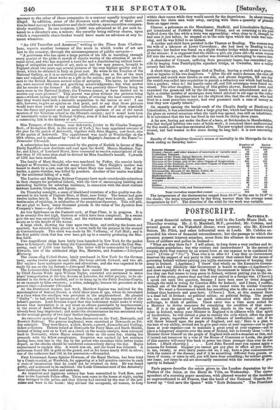POSTSCRIPT.
SATURDA
A great financial reform meeting was held in the Leeds Music Hall, on Thursday evening. Mr. J. G. Marshall, M.P., presided; Mr. Cobden, and several guests at the Wakefield dinner, were present; also Mr. Edward Baines, Mr. Plint, and other influential men at Leeds. Mr. Cobden ex- pounded his views of financial retrenchment; but the passage to which the greatest present interest attaches, arose from the allusion to the enormous force of soldiers and police in Ireland- " What are they there for? I will admit, to keep down a very restless and in- subordinate population; but why restless and insubordinate? Is the system of keeping down that country by an armed force at our expense to be continued for ever? (Cries of "No!") Then who is to alter it? I say that no Government deserves the support of any party in this country that cannot find the means of governing Ireland without putting you to:the enormous expense of keeping that army in Ireland. (Applause.) I throw that wholly on the Executive Govern- ment, and I say distinctly that Government is bound to resign—(Applause)- and more especially do I say that this Whig Government is bound to resign, un- less they can find means to keep peace in Ireland, without putting you to the ex- pense of this army, greater than any that ever existed in a foreign war. (Cheers.) I speak out upon this question, because I have been once or twice dragged through the mud in voting for Coercion Bills for Ireland; and I have, I confess, walked out of the House in disgust on two recent votes for similar Coercion Bills. We want a Government which has something else to offer as a remedy for Ireland than bayonets and poor-laws. (Cheers.) Now, at this moment there is a dead lull in Ireland; no political action; no political feeling. The people are too much horror-struck, too much exhausted with their own intense sufferings, to think of politics. There never was a time more suited for a Minister to devise measures for remedying the condition of that coun- try. If it is the spirit of landlordism that stands in the way of improve- ment in Ireland, unless your Minister in England is in alliance with that spirit of landlordism, he will submit a plan to remedy the evils which affect the mass of the pee*, regardless of the sinister influence of landlordism: and if he will throw himself upon the people of England, and say,' Here is a plan to the best of my ability, devised not to give poor-rates at your expense—not to give loans at your expense—not to maintain a great army at your expense—not to place a temporary cicatrice over the sores of Ireland, but to remedy them '—let a Minister throw himself on the people of England with such a measure as this, and if turned out tomorrow by a vote of the House of Commons or Lords, the people of this country will carry him back to power ten times stronger than ever he was before. (Mach cheering.) . . . Lord John Russell says you cannot apply a panacea for Ireland. Suppose you cannot get any plan to effect all you desire, in ten, twenty, or even thirty years—let us, I say, have a plan commensurate with Use nature of the disease; and if it be something different from grants, or loans of money, or rates-in-aid, you will have done something; for neither grants, nor loans, nor rates-in-aid are necessarily connected with the restoration of pro- sperity to Ireland."


























 Previous page
Previous page